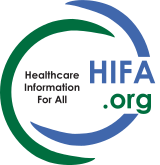Healthcare Information For All
Healthcare Information For All (HIFA) is a global campaign and community of practice of health professionals, publishers, librarians, technologists, researchers, and policymakers. Formerly known as HIFA2015 (Healthcare Information For All by 2015), the network was rebranded as HIFA in 2014. They have over 20,000 members from 2500 health and development organisations in 180 countries worldwide.[1][2]
 | |
| Formation | October 2006 |
|---|---|
| Type | Global Knowledge Network |
| Headquarters | Charlbury, Oxford, UK |
Coordinator | Neil Pakenham-Walsh |
| Website | Official website |
HIFA was formally launched in October 2006 at the 10th Congress of the Association for Health Information and Libraries in Africa in Mombasa, Kenya.[2] The network is administered by the Global Healthcare Information Network, a nonprofit organisation based in the United Kingdom. Universal and user-friendly access to relevant, reliable health information is considered a vital part of meeting the World Health Organization's goal of Health For All and the United Nations Millennium Development Goals and Sustainable Development Goals.[3]
Mission
The HIFA vision is: "A world where every person and every health worker will have access to the healthcare information they need to protect their own health and the health of others". HIFA addresses the information needs of citizens as well as health workers and health policymakers, recognising the importance of citizens, parents and children as providers of care, especially in low-resource settings where health workers may be absent or hard to reach.[4]
The HIFA community interacts on five discussion forums: HIFA, CHIFA, HIFA-Portuguese, HIFA-French, and HIFA-Zambia.
- CHIFA (started 2006), formerly known as CHILD2015, focuses on child health and rights and has more than 3500 global child health professionals.[5] CHIFA is administered jointly by Global Healthcare Information Network, International Child Health Group (Royal College of Paediatrics and Child Health), and International Society for Social Paediatrics and Child Health.
- HIFA-French (started 2010) is a collaboration between the World Health Organization and Global Healthcare Information Network. The forum was originally called HIFA-EVIPNet-French and had a focus on the information needs of policy makers for health in francophone Africa, in association with the Evidence-Informed Policy Network at the World Health Organization.[6] In 2015, the forum expanded its remit to become HIFA-French, in association with the Health Service Delivery and Patient Safety department of WHO.
- In November 2009, the Global Healthcare Information Network and ePORTUGUESe (World Health Organization) launched a Portuguese version of HIFA[7] which has more than 2000 members in the eight Portuguese-speaking countries (Angola, Brazil, Cape Verde, Guinea-Bissau, Mozambique, Portugal, São Tomé and Príncipe, Timor-Leste).
- In May 2011, HIFA-Zambia was launched in collaboration with the Zambia UK Health Workforce Alliance.
Recognition
In June 2010, the Positive Practice Environments Campaign, hosted at the International Council of Nurses in Geneva, officially incorporated the HIFA2015 Fact Sheet: Meeting the information needs of health professionals into their campaign materials to empower health workers worldwide to deliver evidence-informed health services to the global population.[8][9][10]
In May 2011, the British Medical Association hosted the first international HIFA Conference.[11] Virginia Barbour, Editor-in-Chief of PLoS Medicine, said, "It is a shameful fact that in 2011 people are still dying because their healthcare workers don’t have access to the information they need."[12]
From January to September 2011, HIFA underwent an external evaluation funded by the Rockefeller Foundation, which concluded: “HIFA2015 achieves an extraordinary level of activity on minimal resources from which many people around the world benefit".
In the summer of 2012, the European Association of Science Editors (EASE) formally became a new HIFA Supporting Organization. EASE supports the global initiative by advising authors to make abstracts of their papers highly informative, reliable, and easily understandable (see EASE Guidelines for Authors and Translators of Scientific Articles).
References
- Smith, Richard; Koehlmoos, Tracey Pérez (30 June 2011). "Provision of health information for all". BMJ. 342: d4151. doi:10.1136/bmj.d4151. PMID 21724544.
- "Archived copy". Archived from the original on 2015-07-09. Retrieved 2014-09-08.CS1 maint: archived copy as title (link)
- Bailey, C; Pang, T (Jul 17–23, 2004). "Health information for all by 2015?". Lancet. 364 (9430): 223–4. doi:10.1016/S0140-6736(04)16686-5. PMID 15262080.
- Global Healthcare Information Network (2007). "HIFA2015 Foundation Document" (PDF).
- "CHILD2015". HIFA2015. Archived from the original on 2013-04-15. Retrieved 2012-07-23.
- "WHO | Evidence-Informed Policy Network". Who.int. Retrieved 2011-08-19.
- "WHO | The ePORTUGUÊSe network". Who.int. 2011-07-14. Retrieved 2011-08-19.
- "Positive practice environments for health care professionals" (PDF). ppecampaign.org. PPE Campaign. Retrieved 26 March 2014.
- http://www.ppecampaign.org/sites/ppecampaign.org/files/images/PPE_FactSheet_Meeting_the_information_needs_HIFA2015.pdf
- "Invitation to HIFA2015". ppecampaign.org. 2011-01-29. Retrieved 2011-08-19.
- Wise, Jacqui, T (2011-05-10). "Access to health information is vital for low income countries". BMJ. 342: d2950. doi:10.1136/bmj.d2950. PMID 21558356.
- Barbour, Virginia (May 12, 2011). "HIFA2015 Conference: lack of access to healthcare information is lethal". plos.org. Public Library of Science. Retrieved 26 March 2014.